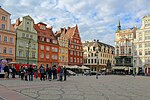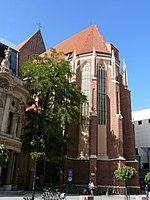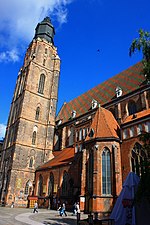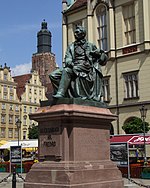White Stork Synagogue
19th-century religious buildings and structures in Poland21st-century attacks on synagogues and Jewish communal organizationsAshkenazi Jewish culture in PolandAshkenazi synagoguesConservative Judaism in Europe ... and 13 more
Conservative synagoguesFormer synagogues in PolandHistory museums in PolandHolocaust locations in PolandInfobox religious building with unknown affiliationJewish museums in PolandMuseums in WrocławNeoclassical architecture in PolandNeoclassical synagoguesReform synagogues in PolandSynagogues completed in 1829Synagogues in WrocławSynagogues preserved as museums

The White Stork Synagogue (Polish: Synagoga Pod Białym Bocianem) is a nineteenth-century synagogue in Wrocław, Poland. Rededicated in 2010 after a decade-long renovation, it is the religious and cultural centre of the local Jewish community, under the auspices of the Union of Jewish Religious Communities in Poland. It is the only synagogue in Wrocław to have survived the Holocaust.
Excerpt from the Wikipedia article White Stork Synagogue (License: CC BY-SA 3.0, Authors, Images).White Stork Synagogue
Geographical coordinates (GPS) Nearby PlacesShow on map
Geographical coordinates (GPS)
| Latitude | Longitude |
|---|---|
| N 51.108055555556 ° | E 17.024722222222 ° |











